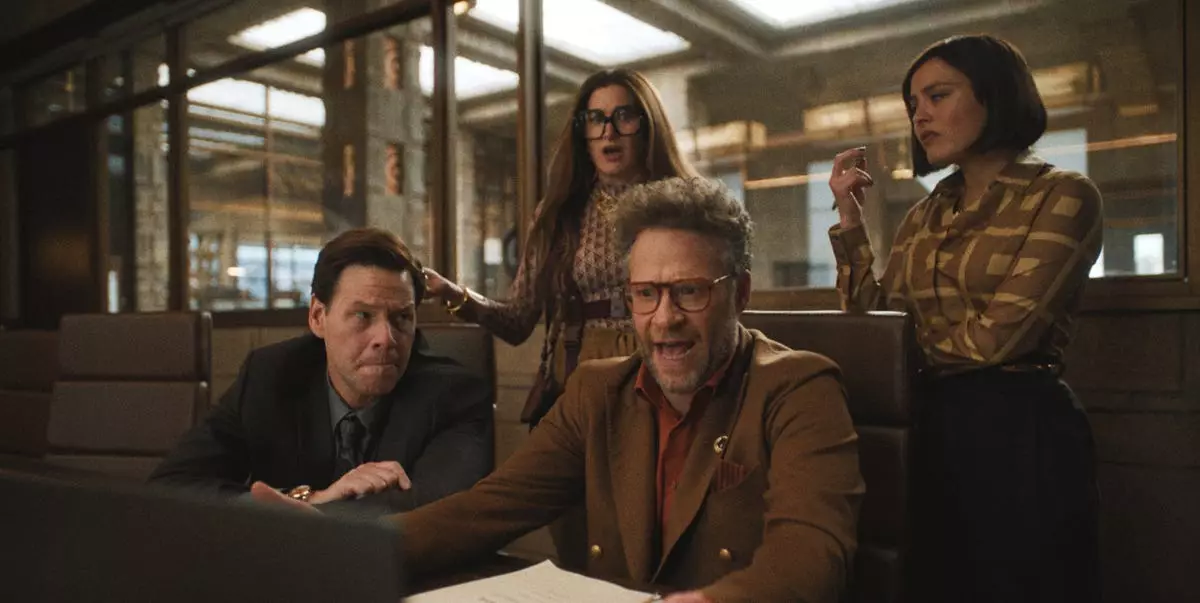In the glitzy bubble of Hollywood, the seams are often bursting under the weight of dreams and egos. “The Studio,” the much-anticipated offering from Apple TV+, seizes this chaos and turns it into comedic gold. Co-directed and led by the inimitable Seth Rogen, who plays Matt Remick—the freshly minted head of Continental Studios—this series offers not just a view behind the curtain but an exhilarating rollercoaster ride through the perils and pitfalls of the film industry.
Rogen’s portrayal of Matt is painfully relatable; he is a character that many in creative industries might resonate with. Picture someone whose lifelong passion for film has landed him in a position he’s always desired, only to find himself drowning in the pressures and complexities of corporate Hollywood. The comedic satire doesn’t stop at mere observations; it plumbs the depths of human emotion, revealing a panicked man wrestling with his own ineptitude while navigating an industry riddled with treachery and grandeur. “I think he’s someone who wishes he was very creative, but is not,” Rogen mentions in an interview on “Fresh Air.” This dichotomy—a dreamer trapped in a nightmare—captures the essence of many in the high-stakes creative field.
A Rich Tapestry of Character and Cameo
The supporting cast line-up in “The Studio” is as impressive as its lead. With talents such as Kathryn Hahn and Chase Sui Wonders, the series promises a rich tapestry of character interactions that will likely stir both laughter and discomfort. But Rogen doesn’t just stop at established actors; the series boasts a star-studded ensemble of cameos, including heavyweights like Martin Scorsese and the likes of Quinta Brunson and Zac Efron. These appearances are not mere gimmicks; they serve as pearls strung along a narrative thread that explores the absurdity of Hollywood while also commenting on the industry itself.
Each half-hour episode has been designed to dig deeper into the delicate psyche of those trying to keep the industry afloat, oscillating between comedic absurdity and poignant reality. It is in these moments of over-the-top scenarios that we often find the raw truths about ambition, failure, and the crushing weight of societal expectations. The stakes are high and the stakes are funny, making viewers laugh in a way that feels oddly cathartic.
More Than Just a Sitcom
However, “The Studio” is not just an attempt at a comedy; it’s an insightful commentary on the film industry’s current climate. Rogen describes the series as a “very personal” project, rooted significantly in real experiences and collective fears shared among industry insiders. He notes that much of the narrative is inspired by actual events, making it a reflection of something much larger than itself. This is crucial; satire works best when it is grounded in reality, and Rogen’s commitment to authenticity appears to elevate the humor from mere jokes to a mirror held up to the audience.
Set to premiere with two gripping episodes on March 26, the release strategy of offering weekly episodes lends itself well to building anticipation and discussion among fans. This staggered approach allows viewers to digest the chaotic brilliance of the series, perhaps provoking a deeper conversation about the state of modern filmmaking and the human frailties that come with ambition.
As “The Studio” invites us into its chaotic embrace, it becomes clear that Rogen and his team are not merely creating entertainment—they are crafting a dialogue about the intricate dance of art and commerce that is Hollywood. Through humor, fear, and a touch of self-deprecation, the series promises to deliver not just laughs but a devastating, yet enlightening, examination of one of the most fascinating industries in the world.


Leave a Reply